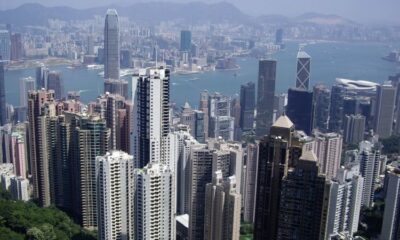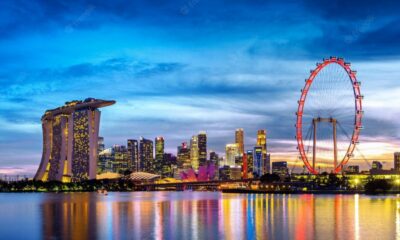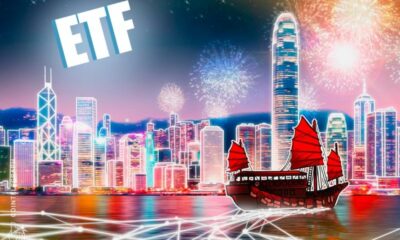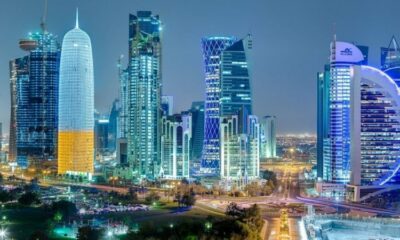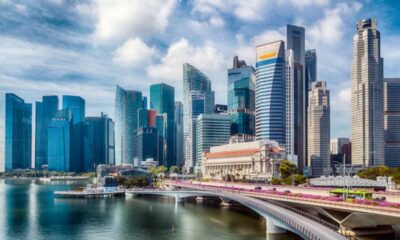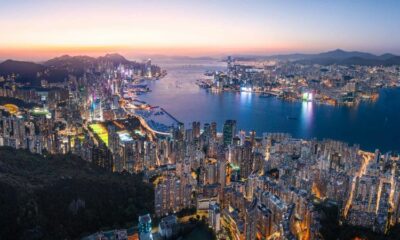Business
Finance Chief Paul Chan informs US businesses that Hong Kong is more open, diverse, and entrepreneurial than Singapore

The finance chief of Hong Kong, who is visiting US business leaders to court companies considering expansion into mainland China and North Asia markets, said that the city is more open, diverse, and entrepreneurial than Singapore.
During lunch on Tuesday, Financial Secretary Paul Chan Mo-po also witnessed the signing of an agreement between a US business association and the Hong Kong government’s investment-attracting arm to advance bilateral trade between the city and the San Francisco Bay Area.
A few hours after Hong Kong police made their first arrests under the domestic national security law that was passed two months ago, Chan gave attendees at the first function of his visit to San Francisco the assurance that the governing principle of “one country, two systems” was “still alive” and “working very well.”
Addressing competition with Singapore and questions from US firms about expanding in the region, he said: “Hong Kong is a lot more entrepreneurial. When it comes to the entrepreneurial spirit and innovation, I think you’ll find it more interesting … Hong Kong is [also] more open and diverse. On lifestyle, Hong Kong is a lot more interesting too.
“Come talk to us. Depending on the scale of the investment, the size of the operation, and the stage of the technology that you’re bringing, we can tailor-make specific packages for you.”
Citing the city’s excellent connectivity, which enables travelers to reach over half of the world’s population in five hours by air, he said it was the perfect place for companies looking to grow into North Asia and the mainland.
Chan also emphasized the advantages of Hong Kong’s stock market over Singapore’s, calling the latter “no comparison in terms of depth and breadth.”
Companies listed on the Hong Kong stock exchange had a market capitalization of HK$32.1 trillion, while Singapore’s stock exchange was HK$7.4 trillion. However, the state of the city has a bigger and supposedly more diverse economy.
Co-organizing the luncheon were the Bay Area Council, a business association with over 300 members based in California, and the Hong Kong Economic and Trade Office in San Francisco. It took place in a five-star hotel’s dining room in the heart of San Francisco.
About a hundred representatives from trade associations, start-ups, and companies in California attended; however, there were no US officials in attendance.
Chan stated that Hong Kong continues to be appealing as “a springboard” for accessing the Asian and mainland markets in his speech, “Hong Kong’s New Chapter: Empowering Growth through Innovation and Sustainability.”
“Coming to Hong Kong, on the one hand, you will have convenience and sometimes priority access to the mainland,” he said. “At the same time, from there, your international character and your international facets will be preserved. Talent, goods, and data are movable.”
The Bay Area Council and InvestHK signed a memorandum of understanding on joint promotion investment, with an emphasis on sustainable development and green finance.
Beijing plans to transform Hong Kong, Macau, and nine Guangdong cities into a hi-tech economic powerhouse by 2025. The first-ever joint delegation, made up of senior officials from Hong Kong, Macau, and Guangdong province, visited San Francisco and Berkeley to promote business opportunities in the Greater Bay Area.
The joint delegation will remain in California through Friday to attend the US-China High-Level Event on Subnational Climate Action. The delegation left Paris after a four-day visit. Participation in the Bay to Bay Dialogue event with Californian businesses is also anticipated.
Chan is making his second trip to San Francisco in as many months. In November of last year, he traveled to the city on behalf of Mayor John Lee Ka-chiu to attend the Asia-Pacific Economic Cooperation summit.
US-sanctioned Lee declined the invitation, citing a prearranged agenda conflict.
During their meeting, US President Joe Biden and Chinese President Xi Jinping decided to collaborate on the risks posed by artificial intelligence.
Before their meeting, California Governor Gavin Newsom traveled for a week in October of last year, visiting the mainland and stopping briefly in Hong Kong, in part to “advance climate action,” according to his office.
Due in large part to the concentration of tech giants such as Apple, Google, and Facebook that call the San Francisco Bay Area home, the region has emerged as a global center for technological innovation.
The mainland is also looking for foreign investment to boost its flagging economy, which has been hindered by low business confidence and a downturn in the real estate market. This is the backdrop against which the Hong Kong delegation is waging its lobbying campaign.
-

 Business3 weeks ago
Business3 weeks agoPrakash and Kamal Hinduja: Driving Social and Environmental Change
-
Education4 weeks ago
Fred DuVal: University Leadership as a Critical Resource for Climate Change Research and Life-Saving Solutions
-

 Cryptocurrency3 weeks ago
Cryptocurrency3 weeks agoDesigned For The Masses: How Akasha (AK1111) Is Unlocking Crypto For The Next Billion Users
-

 Health3 weeks ago
Health3 weeks agoThe Hinduja Brothers Commitment to Global Health: Empowering Communities Across Borders
-

 Cryptocurrency4 weeks ago
Cryptocurrency4 weeks agoNexaglobal & Future World Token (FWT): Could This Be the Next Big Crypto Investment of 2025?
-

 Startup2 weeks ago
Startup2 weeks agoCost-Saving Strategies Every Small Business Owner Should Know to Boost Efficiency
-

 Startup3 weeks ago
Startup3 weeks agoMatthew Denegre on the Art of Deal Sourcing: Finding the Right Investment Opportunities
-

 Health2 weeks ago
Health2 weeks agoSt. John’s Community Health Examines Innovations in Pharmacy Access

